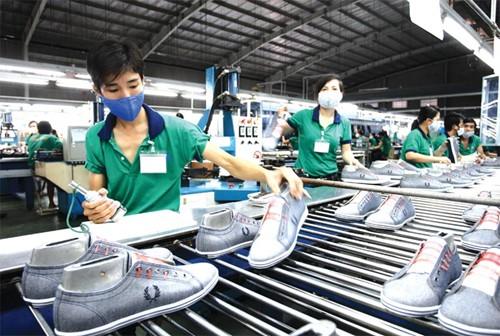Foreign footwear companies eager for TPP

In only the four months from June to September, Korea’s Chang Shin Vietnam, producing Nike sports shoes, started work on two projects valued at $12 million to expand production in southern province of Dong Nai.
The company’s general director Jin Woo Bang said, “With its advantages in material, workforce, high production capacity, and product quality, our global partner Nike group decided to shift massive volume production from Indonesia and China to Vietnam in 2014, and this is likely to further increase in the ensuing years.”
Another Korean-owned firm Tae Kwang Vina Industrial Limited, based in Bien Hoa II industrial park in Dong Nai, also invested into upping its production to maximise TPP benefits.
“Foreign businesses are the most likely to benefit from the TPP, as they have strong advantages in scope, governance, and support from their parent companies and global business partners,” said Nguyen Thi Thanh Xuan, general secretary of the Vietnam Leather and Footwear Association (Lefaso).
The export ratio of foreign producers has risen considerably in the last three years, from 65 per cent of the footwear sector’s total export value to 77 per cent currently.
Like the textile-garment industry, footwear mainly imports materials from markets such as China and Taiwan.
In 2012 footwear material imports exceeded $3 billion, mostly committed by domestic companies, whereas the localisation rate of foreign enterprises was around 80 per cent.
Footwear is a sector that will see several benefits from the TPP, one of which is a zero per cent tax rate, but to qualify businesses need to source materials locally or import from TPP member countries.
According to an executive of Vinh Binh Footwear based in Dong Nai province’s Trang Bom district, the sector’s imports primarily come from China, Korea, or India, which are not TPP members.
“If Vietnam shifted to importing from TPP members like Mexico or Brazil, then production costs would rise and we would be less competitive against foreign rivals,” said the Vinh Binh source.
This forecast was acknowledged by Xuan from Lefaso who said, “Domestic firms are strong in number but small in size, whereas global importers only set their sights on major suppliers with cutting-edge technology and modern production facilities. Foreign enterprises are nearly certain to be their first choice.”
What the stars mean:
★ Poor ★ ★ Promising ★★★ Good ★★★★ Very good ★★★★★ Exceptional
Latest News
More News
- Hermes joins Long Thanh cargo terminal development (February 04, 2026 | 15:59)
- SCG enhances production and distribution in Vietnam (February 04, 2026 | 08:00)
- UNIVACCO strengthens Asia expansion with Vietnam facility (February 03, 2026 | 08:00)
- Cai Mep Ha Port project wins approval with $1.95bn investment (February 02, 2026 | 16:17)
- Repositioning Vietnam in Asia’s manufacturing race (February 02, 2026 | 16:00)
- Manufacturing growth remains solid in early 2026 (February 02, 2026 | 15:28)
- Navigating venture capital trends across the continent (February 02, 2026 | 14:00)
- Motivations to achieve high growth (February 02, 2026 | 11:00)
- Capacity and regulations among British areas of expertise in IFCs (February 02, 2026 | 09:09)
- Transition underway in German investment across Vietnam (February 02, 2026 | 08:00)
















 Mobile Version
Mobile Version